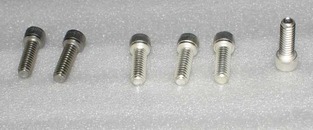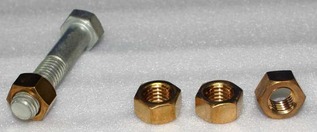Call: 708-425-9080
Galling and Fasteners for Vacuum Service
Galling is the degradation of metal surfaces which results in metal being transferred from one surface to the other. Galling can result when there is friction between the surfaces of like metals. Sliding shafts and rotating shafts will be subject to galling if the shaft and the collar are made of the same alloy. Fasteners are also subject to galling. While fasteners are not in continuous motion, friction between the external and internal threads exists when the fastener is being tightened. In severe cases galling can result in fasteners becoming completely frozen.
To avoid galling of fasteners a lubricant or "antiseize" is often used. There are a variety of products available. Some lubricants are formulated particularly for aluminum or stainless steel, while others are formulated for high temperature service or corrosive environments. In UHV or highly clean applications, however, the use of antiseize is often avoided. Certainly antiseize would not be applied to fasteners internal to a UHV chamber. One might think that with adequate care, antiseize could be applied to external threads without contaminating the interior of a chamber. In practice, once antiseize is applied to threads it is easily transferred to gloves and tools and from there to other surfaces. For this reason antiseize is sometimes avoided entirely.
The use of dissimilar alloys is another method to avoid galling. In vacuum applications, it is common to encounter silicon bronze nuts in combination with stainless steel bolts. Silver plated bolts may be used with threaded stainless steel flanges. The C651 silicon bronze alloy often used for fasteners has a tensile strength of 70 ksi and a yield strength of 55 ksi, making it similar in strength to 304 stainless steel. Silicon bronze fasteners typically cost two to four times more than their stainless steel counterparts. Silver plated bolts typically cost about twice as much as a similar unplated stainless steel bolt.
To avoid galling of fasteners a lubricant or "antiseize" is often used. There are a variety of products available. Some lubricants are formulated particularly for aluminum or stainless steel, while others are formulated for high temperature service or corrosive environments. In UHV or highly clean applications, however, the use of antiseize is often avoided. Certainly antiseize would not be applied to fasteners internal to a UHV chamber. One might think that with adequate care, antiseize could be applied to external threads without contaminating the interior of a chamber. In practice, once antiseize is applied to threads it is easily transferred to gloves and tools and from there to other surfaces. For this reason antiseize is sometimes avoided entirely.
The use of dissimilar alloys is another method to avoid galling. In vacuum applications, it is common to encounter silicon bronze nuts in combination with stainless steel bolts. Silver plated bolts may be used with threaded stainless steel flanges. The C651 silicon bronze alloy often used for fasteners has a tensile strength of 70 ksi and a yield strength of 55 ksi, making it similar in strength to 304 stainless steel. Silicon bronze fasteners typically cost two to four times more than their stainless steel counterparts. Silver plated bolts typically cost about twice as much as a similar unplated stainless steel bolt.
There may be times when a system must be assembled without antiseize and silver plated bolts or silicon bronze nuts are unavailable. In this case, tightening the fastener slowly may help to avoid galling because galling is the result of friction.
The time and effort spent trying to remove seized fasteners or to repair damaged threads on a flange or chamber can easily dwarf the cost of some specialty fasteners or a tube of antiseize. Whether through purchasing silicon bronze nuts, silver plated bolts, or a quality antiseize, we recommend that galling be avoided as one of the steps toward achieving the lowest total cost of ownership.
The time and effort spent trying to remove seized fasteners or to repair damaged threads on a flange or chamber can easily dwarf the cost of some specialty fasteners or a tube of antiseize. Whether through purchasing silicon bronze nuts, silver plated bolts, or a quality antiseize, we recommend that galling be avoided as one of the steps toward achieving the lowest total cost of ownership.





